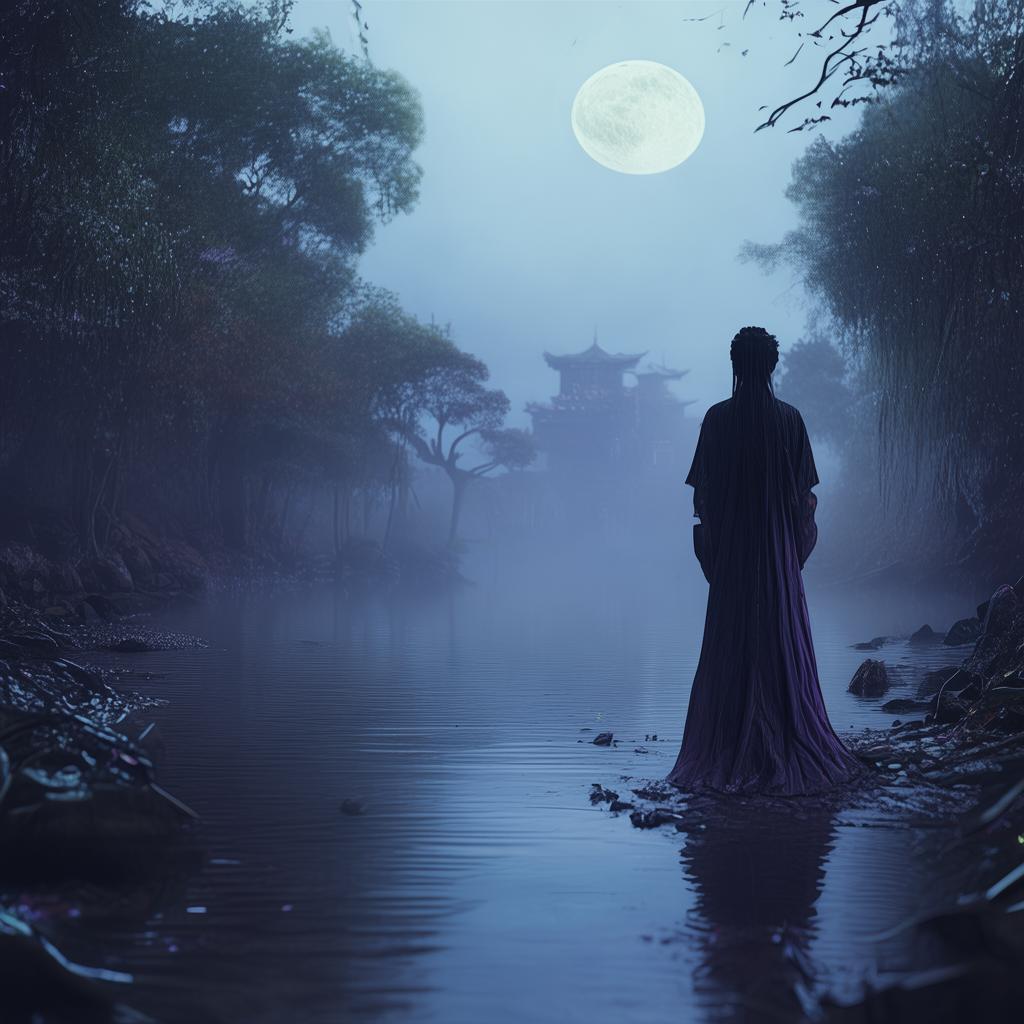Whispers of the Qing Dynasty: The Chatu's Enigma
In the heart of the Qing Dynasty, where the whispers of the past still lingered in the cobwebs of ancient temples, there was a legend that had been passed down through generations. The Chatu, a figure cloaked in mystery, was said to be the guardian of a forgotten temple shrouded in silence and shadows. The Chatu's legacy was a tapestry of riddles, each more enigmatic than the last, and it was believed that those who could unravel the Chatu's enigma would be granted a wish, or face a dire fate.
Amidst the bustling streets of Beijing, a young scholar named Lin Wei led a life of quiet contemplation. His days were filled with the pursuit of knowledge, his nights with the study of ancient texts. But Lin Wei was no ordinary scholar; he had a gift for understanding the unspoken language of the past, a gift that had led him to uncover hidden secrets within the annals of history.
One stormy evening, as the wind howled through the alleyways and the rain beat a relentless rhythm against the old tiles, Lin Wei received a strange letter. The letter was written in an ancient script, and it spoke of the Chatu, the forgotten temple, and a riddle that had been hidden within the walls of the capital. The letter ended with a dire warning: "Who dares to seek the Chatu's legacy shall face the wrath of the past."
Lin Wei's curiosity was piqued. The idea of a hidden legacy, a riddle that could change the course of his life, was too tantalizing to ignore. He decided to seek out the temple, a place that had been lost to time and memory. With the help of an old map and the guidance of an elderly monk, he found the entrance to the temple hidden beneath a pile of debris and overgrown ivy.
The temple was a haunting sight, its once-grand architecture now reduced to a skeleton of its former self. The air was thick with the scent of decay and the echoes of forgotten prayers. As Lin Wei stepped inside, he felt a chill run down his spine. The walls were adorned with ancient murals, depicting scenes of the Qing Dynasty and the Chatu's rise to power.
The first riddle was simple yet profound: "I am not a man, yet I have a heart. I am not a woman, yet I bear children. What am I?" Lin Wei pondered the question, and as he did, he noticed a small, ornate box on the altar. He opened it to find a scroll, which contained the answer: "I am the wind."
The next riddle was more challenging: "I am not a river, yet I flow. I am not a mountain, yet I stand. I am not a tree, yet I grow. What am I?" Lin Wei wandered through the temple, searching for clues. He found a stone tablet with a single, ancient symbol carved into it. The symbol was that of a dragon, and it was then that he realized the answer: "I am the spirit of the land."
As Lin Wei continued to unravel the riddles, he discovered that each one was a reflection of the Qing Dynasty's history, a testament to the Chatu's power and influence. The final riddle was the most difficult of all: "I am the key to the past, the present, and the future. I am the bridge between life and death. What am I?" Lin Wei felt a sense of urgency as he searched for the answer. He knew that the Chatu's legacy was not just a collection of riddles, but a warning that the past could not be forgotten.

In a moment of clarity, Lin Wei realized that the answer was hidden in the temple itself. He found a hidden chamber beneath the altar, where the Chatu's true form was revealed. The Chatu was not a man, nor a ghost, but the collective spirit of the Qing Dynasty, bound to the temple by the riddles and the legacy it protected.
As Lin Wei faced the Chatu, he understood the true nature of the enigma. The Chatu's legacy was a reminder that the past could not be escaped, that the actions of the Qing Dynasty had consequences that would echo through time. With a heavy heart, Lin Wei made his decision. He chose to honor the Chatu's legacy, to protect the secrets of the past, and to ensure that the lessons of history would not be forgotten.
The Chatu's spirit nodded in approval, and Lin Wei felt a surge of energy course through him. He knew that his life would never be the same, but he also knew that he had found his purpose. As he left the temple, the storm had passed, and the sun began to rise over the ancient city. Lin Wei felt a sense of peace, knowing that he had faced the Chatu's enigma and emerged victorious.
In the end, the Chatu's legacy was not a wish or a curse, but a lesson that would guide Lin Wei through the rest of his days. The Qing Dynasty's past was a part of him now, and he was determined to ensure that it would not be lost to time.
✨ Original Statement ✨
All articles published on this website (including but not limited to text, images, videos, and other content) are original or authorized for reposting and are protected by relevant laws. Without the explicit written permission of this website, no individual or organization may copy, modify, repost, or use the content for commercial purposes.
If you need to quote or cooperate, please contact this site for authorization. We reserve the right to pursue legal responsibility for any unauthorized use.
Hereby declared.









